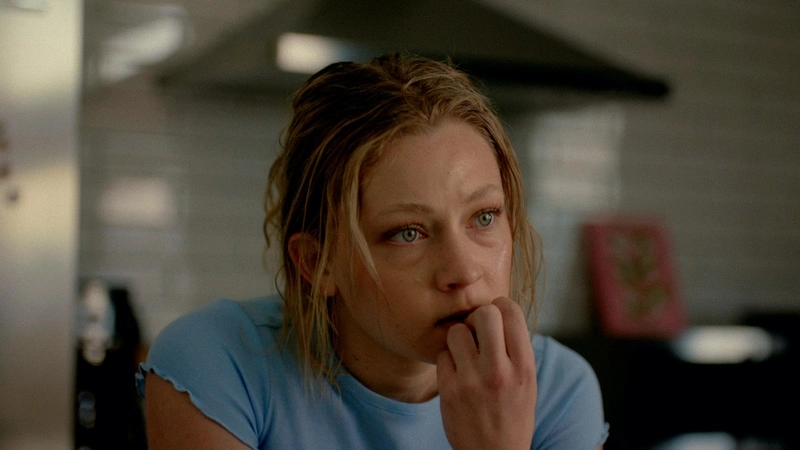Amar Wala’s film “Shook” circles Ashish (Saamer Usmani), a writer trying to find his moorings and waiting for a breakout moment. He is drifting and lost. As his friends point out, self-pity could very well be his most definitive trait. He’s stuck in various senses of the word. It doesn’t elude him that he really needs to get his shit together. He’s mostly scrabbling through the day without a sense of direction or purpose.
He’s written a novella. His agent is pushing for it, but to no avail. Publishers have cold feet when they insist on departing from immigrant diaspora travails. He’s advised to churn out a couple of short stories, but he is stranded in that zone as well. There’s no progress on that front. He’s just scraping through the days, meandering without knowing how to steer his life. He graduated with a degree in creative writing. Since then, life has been rocky and confusing. Then there’s the family issue. His father cheated on his mother. Parents split. Ashish has cut off ties with his father (Bernard White). Neither is he in a comfortable space with his mother. He yearns for some kind of release.
His parents’ estrangement has left a deep mark on him, almost freezing him in a way that refuses to let him move forward. Somewhere deep within, he nurses hope of their reuniting even though he is full of venom and spite for his father. But he also takes for granted his mother, who is caught in a loop of denial. That she can grow and rebuild herself from all the hurt and agony and seek a new partner strikes him as a betrayal.
Wala essentially charts Ashish’s gradual acceptance of the new changes in his family and the inevitable confrontation with his own blind spots. The film cycles through Ashish’s flailing and having a clearer sense of what he’s seeking with patience and compassion. But it is also wise enough to draw out the not-so-great things about him, which he is determinedly shuffling into the backseat. It’s his friends who pull him through and give him a harsh, necessary perspective.
It’s a willed reluctance to admit a reappraisal of relationships that’s stultifying him. Wala charmingly orchestrates the intimacy between Ashish and a fleeting romantic partner. The giddiness leading up to a kiss and the slow unfurling of a connection between to-be lovers, Usmani and Forsyth, is absolutely splendid at evoking this. It could have been easily diluted with sweetness, and the white-brown stereotype clashes a bit tired, but the actors bring a wonderful freshness even in a rather uninspired scene where he takes her to a Hakka joint, and she cannot handle the flavors.

The film also pivots on the tentative re-bonding between him and his father, who has been diagnosed with Parkinson’s. Ashish takes him to doctor’s appointments; they cook together, and slowly, the thawing in their relationship starts. “Shook” earns its quiet emotional authenticity from these two endearingly etched relationships. Usmani keeps us arrested and empathetic even as the screenplay falters, especially with the sketchy mother-son relationship.
Frida Kempff’s “The Swedish Torpedo” is a brilliant, focused dive into the ferocity of a woman’s desire wrangling to breathe and exert herself without unnecessary mediations. Though the film is set in 1939, right before the Second World War broke out, its thematic interests resonate in their exactitude even today. The specificity of the film’s Swedish roots melts away once you get to the heart of Kempff’s interrogations. Family and society ganging up on women the minute they seek to step outside the normative boundaries are severe realities today, just as they were almost half a century ago.
In a singularly committed turn, Josefin Nelden embodies the legendary swimmer Sally Bauer, who became the first Scandinavian to cross the English Channel. It’s a story of grit and resolve in the face of seemingly insurmountable hardships. Most importantly, Kempff centers on a woman bent on chasing her dreams while everyone around her doubts her capability and would rather relegate her to domesticity. Bauer also has a son, Lars (Arthur Sörbring), born from an illicit relationship with a sports journalist, to raise. The father, Henry (Mikkel Boe Følsgaard), has a wife and balks at publicly owning up to the romance with Bauer and acknowledges Lars.
She’s forced into a position where she has to choose between being a ‘good mother’ and pursuing her ambitions, which is made to entail losing access to her son. She tries but cannot fit into the mold of a content homemaker. Being pushed into taking lessons at a housewife’s school never catches her interest. It’s only being in water where she feels anchored and can breathe. Kempff beautifully brings alive the exhilaration in the stolen moments when Bauer sneaks a swim.
At one point, she is so immersed in it that she wholly forgets her son, who keeps track of time. With such bracing, pointed, and uncompromising observations, Kempff’s “The Swedish Torpedo” excels at mining a woman’s steely conviction to chart her own course in a man’s world, irrespective of what others have to say about it or being frowned on. Commandeering the film is an astonishing Nelden, superlative at capturing both the continued exhaustion of being patronized and single-minded, no-holds-barred fervid belief.




![IT [2017]: Terror Comes From Devil’s Home](https://79468c92.delivery.rocketcdn.me/wp-content/uploads/2017/09/pmcvariety.files_.wordpress.comit-movie-stephen-king-5-8b704c1c0953888ade975e489a28fd320ed46ed6-768x432.jpg)
![Tramps [2017]: Too Broke To Love](https://79468c92.delivery.rocketcdn.me/wp-content/uploads/2017/04/Tramps-768x432.jpg)


![Shiddat [2021] Review – Dated Bollywood Romance is a Mediocre Excuse in Disguise of Filmmaking](https://79468c92.delivery.rocketcdn.me/wp-content/uploads/2021/10/Shiddat-Movie-2-768x427.jpg)